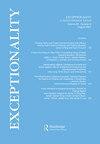Initial Exploration and Implementation Efforts of SWPBIS Tier 1 in Cyprus: Results from Two Model Demonstration Sites
IF 0.9
4区 教育学
Q4 EDUCATION, SPECIAL
引用次数: 0
Abstract
ABSTRACTStudent behavioral problems are a concern among educators in Cyprus. Policy and practice measures implemented in Cyprus have primarily focused on addressing problem behaviors at the individual level. Recently, behavior support implementations have occurred at a schoolwide level. This mixed methods study presents the results of two model demonstration sites of Schoolwide Positive Behavior Interventions and Supports (SWPBIS) implemented in two elementary schools in Cyprus. Exploration and initial implementation efforts focused on adapting and contextually fitting the SWPBIS primary prevention’s four core features (outcomes, data, practices, systems) to meet the values and needs of Cypriot schools. Intervention components included defining and teaching expected classroom behaviors, acknowledging and reinforcing social expectations, re-directing and correcting social errors, and collecting data to make informed decisions. Treatment fidelity was measured three times throughout the study. Outcome measures included disruptive behavioral incidents and the staff’s social acceptability of intervention components. Results are discussed, and implications for practice in implementing SWPBIS are suggested within the centralized educational context of Cyprus. AcknowledgmentsThe authors wish to thank the school staff and the administration from both elementary schools for their collaboration in this research project.Disclosure statementNo potential conflict of interest was reported by the author(s).Additional informationFundingThis research was supported by the European Commission (Research Executive Agency) Marie Skłodowska-Curie International Outgoing Fellowship Grant # PIOF-GA-2012-331065.塞浦路斯SWPBIS Tier 1的初步探索和实施工作:来自两个示范站点的结果
学生行为问题是塞浦路斯教育工作者关注的问题。在塞浦路斯实施的政策和实践措施主要侧重于解决个人一级的问题行为。最近,行为支持已经在全校范围内实施。这项混合方法研究展示了在塞浦路斯两所小学实施的全校积极行为干预和支持(SWPBIS)的两个模型示范点的结果。探索和初步实施工作的重点是适应和适应SWPBIS初级预防的四个核心特征(结果、数据、实践、系统),以满足塞浦路斯学校的价值观和需求。干预的组成部分包括定义和教授预期的课堂行为,承认和加强社会期望,重新指导和纠正社会错误,以及收集数据以做出明智的决定。在整个研究过程中测量了三次治疗保真度。结果测量包括破坏性行为事件和员工对干预成分的社会接受度。讨论了结果,并建议在塞浦路斯集中教育背景下实施SWPBIS的实践意义。作者希望感谢两所小学的学校工作人员和管理人员在本研究项目中的合作。披露声明作者未报告潜在的利益冲突。本研究由欧洲委员会(研究执行机构)Marie Skłodowska-Curie国际离职奖学金资助# PIOF-GA-2012-331065支持。
本文章由计算机程序翻译,如有差异,请以英文原文为准。
求助全文
约1分钟内获得全文
求助全文

 求助内容:
求助内容: 应助结果提醒方式:
应助结果提醒方式:


